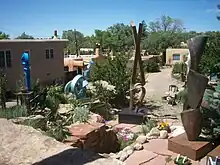Canyon Road, Santa Fe, New Mexico
Canyon Road is an art district in Santa Fe, New Mexico[1] with over a hundred art galleries and studios exhibiting a wide range of art, including Native American art and antiquities, historical and contemporary Latino art, regional art, international folk art, and contemporary art.
.jpg.webp)
History
Canyon Road is a long, narrow road that leads to the Sangre de Cristo Mountains. It runs parallel to the Acequia Madre ("mother ditch"),[2] an irrigation ditch dating back to 1680. Prior to Spanish arrival, the road was a footpath between the Santa Fe River Valley and Pecos Pueblo.[2]
Canyon Road was once a primarily residential neighborhood.[2] Houses built in the Pueblo Revival style, in accordance with the local Spanish Colonial and Pueblo methods, were constructed with adobe walls and courtyards, often as compounds for extended family.

Artists were drawn to its beauty, particularly the Los Cinco Pintores in the 1920s.[2] Olive Rush (1873–1966) was a prominent early Canyon Road artist who maintained a studio at 630 Canyon, which she donated to the Society of Friends.[2] It is still a Quaker meeting hall today. Over time, artists created a subculture of artist-run studios and galleries, and as Santa Fe became more of a tourist destination, Canyon Road became known to the wider world.[1]
Traditions
The area hosts a "Farolito walk" open house event on Christmas Eve that can attract thousands to the area.[3][4]
See also
- El Farol Bar problem, a game theory problem inspired by a bar on Canyon Road
- Turner Carroll Gallery, "gallery" on Canyon Road
- Cristo Rey Church
References
- "Canyon Road". TripAdvisor. Retrieved July 29, 2011.
- Leach, Nicky (24 November 2009). Insiders' Guide to Santa Fe (5th ed.). Lanham, MD: Rowman & Littlefield. p. 122. ISBN 978-0-7627-5346-8. Retrieved 24 November 2015.
- Thousands hit Canyon Road on warm night Tom Sharpe, The Santa Fe New Mexican 12/24/2010
- "Farolitos by Moonlight," Tom Sharpe, The Santa Fe New Mexican, 12/24/2007